
We continue our conversation with Brazilian filmmaker Petra Costa about her new Netflix documentary, Apocalypse in the Tropics. The film delves into the explosive growth of evangelical Christianity in Brazil and how it fueled the rise of former far-right President Jair Bolsonaro, who is facing trial for an alleged coup attempt following his defeat in the 2022 presidential election.
“I really see this film as a parable of our times, where we have leaders that are trying to destroy democracy from within,” says Costa. “Instead of proposing solutions for a world that is in danger and going towards ultimate collapse, they’re actually trying to accelerate that collapse. And that has very much to do with this apocalyptic theology.”
Transcript
AMY GOODMAN: This is Democracy Now!, democracynow.org, The War and Peace Report. I’m Amy Goodman, with Nermeen Shaikh.
NERMEEN SHAIKH: We’re joined now for Part 2 of our conversation with Brazilian filmmaker Petra Costa. Her 2019 film, Edge of Democracy, was nominated for an Academy Award. It traced the rise and fall of democracy in Brazil from 1985 through the first election of President Luiz Inácio Lula da Silva, through the years in power of the Brazil’s Workers’ Party until the impeachment of Lula da Silva’s protégée, Dilma Rousseff, in 2017.
In her new documentary, Petra Costa traces the rise of Christian nationalism in Brazil and its power in politics. It’s called Apocalypse in the Tropics. Let’s go to a clip from the film which begins with images of crowds of supporters surrounding former Brazilian President Luiz Inácio Lula da Silva after he was released from prison. He had been jailed following a corruption conviction that was later annulled. The first voice in the clip is director Petra Costa, followed by a leading evangelical pastor and adviser to former President Bolsonaro, Silas Malafaia.
PETRA COSTA: When he was sent to prison, half the country felt robbed of the chance to vote for their candidate, while the other half felt that he deserved it. Now that he was out, joy and anger had switched sides, and the memory of his two terms as president, where millions were lifted out of poverty, prematurely launched the next presidential race and put him ahead in every poll.
SILAS MALAFAIA: [translated] How does that happen? How is it even possible for someone to run the Workers’ Party while in prison? Are you really going to tell me that a guy like this, when he was president and had the power in his hands, had nothing to do with this corruption? That’s a joke. I’m going to grab some coffee. That’s a joke. This is outrageous. This is — this is nothing but a vanity show from the minister.
PETRA COSTA: [translated] What do you think is going to happen in 2022?
SILAS MALAFAIA: [translated] He’s going to lose the election. You know why? He’s screwed in the evangelical world. He’s screwed in the evangelical world, completely screwed. You can quote me on that. And there’s over 30 — we’re over 30% of the population. It’s not going to work for him.
AMY GOODMAN: That last voice, Silas Malafaia, is a well-known evangelical, very influential Brazilian evangelical pastor, one of the focuses of Petra Costa’s new film, Apocalypse in the Tropics.
Thank you so much for staying for Part 2 of this conversation. So, we’re talking to you when your film is just a big deal because it’s come out and it’s so remarkable to President Trump and the Secretary of State Marco Rubio putting a 50% tariff on Brazilian products, unless the former disgraced president of Brazil Bolsonaro’s trial is ended, who was involved with — is being charged with being involved with the attempted coup of January 8th. But I want to go to Lula, the current president. He’s outraged by what President Trump is trying to do, interfering with the internal affairs of the country. But we just showed that clip of him coming out of prison. Talk about him being jailed, being cleared and becoming president again of Brazil, and yet where the evangelical force is standing today and opposing him, and his response to that, because you have an amazing conversation with him.
PETRA COSTA: Yes. So, Brazil had — Lula was allied with evangelicals during his government. The evangelical population grew 135% during the Workers’ Party’s government. And in 2016, precisely when I was making The Edge of Democracy, that alliance broke, and the evangelicals started to support, soon after, far-right President Jair Messias Bolsonaro and helped elect him, declaring him to be the messiah, in many cases. His attempted assassination was used —
AMY GOODMAN: This is Bolsonaro’s.
PETRA COSTA: Yes, was used as a sign of God, was interpreted as a sign of God, that Bolsonaro would then save the nation, was chosen by God to save the nation.
AMY GOODMAN: Very similar to Trump.
PETRA COSTA: Trump would use a similar rhetoric a few years later. I don’t know how inspired he was by the rhetoric of Bolsonaro, but it’s really uncanny, the similarities.
Then, Lula, when I interviewed him, he said something very interesting, which is he thinks that the mistake of socialism was denying religion. And what I think Lula is getting at is what much of our film has discovered, the investigation that we did discovered, which is that since the '70s and ’80s, with the decline of liberation theology and of the Catholic Church, and the rise of prosperity theology and then dominion theology, the space of religion has been occupied more and more by the far right. And Lula is basically saying what other people are saying, which is that there's no empty space in politics. So, when people lose faith in democracy, when no — when the Catholic Church is in decline, that space is occupied by the far right. And that’s the situation in Brazil right now.
In the last election, 2022, when Bolsonaro lost, he had 70% of the evangelical vote. That was more than in any other segment, if you count for race, class, everything. And that same 70% now disapproves of Lula’s government. What it shows is a phenomenon where people are voting less and less for their economic interest and more based on moral values, moral values that are very inspired by the spread of misinformation. The most spread misinformation in the last election was that Lula would close churches and ban unisex bathrooms.
AMY GOODMAN: Very similar to what we’re seeing here in the United States.
PETRA COSTA: I think very inspired by what has been happening in the United States, yeah.
NERMEEN SHAIKH: So, could you explain — Petra, you mentioned — why did evangelicals break with Lula? And also, give us a sense of the — you know, we get some of that from the film — the range and diversity of people in Brazil who are evangelicals or support evangelical — the evangelical movement.
PETRA COSTA: The evangelical movement in Brazil has changed quickly in the last years. It was mainly a working-class religion, and now it’s reaching more and more the upper classes, as well, tied also to the rise of agribusiness and that culture.
And the reason why evangelicals broke with Lula is, they say, Silas says, was when the Workers’ Party decided to embrace a more minority rights agenda, defending homophobia — trying to pass a law that would forbid homophobia, which Dilma approved and supported, and things of that sort. There are other narratives that attribute that more into a war of taxation, some churches not wanting to pay the necessary taxes. And what — Bolsonaro gave the greatest tax exemption to pastors and evangelical churches during his government and gave them really complete access to the presidential palace.
And that’s why we see a marriage that still stands to this day. Even with Bolsonaro ineligible, most evangelical, prominent evangelical, leaders continue to support him and any far-right candidate that he will decide. Last weekend, we saw a rally that was organized by Malafaia asking for Bolsonaro’s pardon for the coup attempt. And in that rally, Bolsonaro says, “It doesn’t matter who is the president. Give me 50% of the Congress, and I will change the destiny of this nation.”
NERMEEN SHAIKH: And, actually, explain. How many evangelicals are there now in the —
PETRA COSTA: Twenty-six percent.
NERMEEN SHAIKH: In Congress? And then —
PETRA COSTA: No.
NERMEEN SHAIKH: Sorry.
PETRA COSTA: Twenty-six percent of the population is evangelical. Twenty percent of Congress is evangelical.
AMY GOODMAN: So, let’s go to the clip of Bolsonaro speaking at a rally just two weeks ago.
JAIR BOLSONARO: [translated] We can solve Brazil’s problems. Let me repeat: Give me 50% of the Chamber of Deputies and 50% of the Senate, and I will change Brazil’s destiny.
AMY GOODMAN: So, here is Bolsonaro. He’s actually on trial — right? — for the attempted coup. But explain what he’s talking about here.
PETRA COSTA: Well, he’s giving a messianic message, that it doesn’t matter who is elected president; he will change the destiny of the country. And I think it’s very aligned with this dominionist theology of taking over the three branches of government. And right now Brazil’s Congress is the most conservative Congress in Brazil’s history. And we see a war taking place where the government, Lula’s government, is currently trying to tax the rich. Brazil is one of the countries that least taxes the rich in the world. We have — we’re one of the most unequal countries in the planet. The Congress is not giving in to the idea of taxing the rich. And for you to have an idea, taxing the ultra-rich in Brazil, which would be 50 families, would bring $230 billion into the government. So, that’s what we have, a very conservative Congress that is immobilizing the government in many ways and not allowing for the government to pass bills in favor of the population.
NERMEEN SHAIKH: And if you could give — you said 26% of Brazil’s population is evangelical. How does the rest of the population break down in terms of political orientation? I mean, your film, as you mentioned earlier, as well, you know, it kind of tracks the breakdown of the secular ideal in Brazil, which I think is mirrored elsewhere, as well. You know, so, how much, would you say, of the Brazilian electorate is still committed to that idea, the separation of church and state, which you talk about in the film, versus this 26% who are evangelical?
PETRA COSTA: Around 50% or more of the population is Catholic, identifies as Catholic. The thing is that what we found in this film is that a great part even of the evangelical electorate is very unsatisfied with this mixture of religion and politics, because persecution has been happening in churches against anyone who speaks against Bolsonaro. I portray in the film a pastor called Paulo Marcelo. That pastor says that he was expelled from his church after declaring that he would not support Bolsonaro and that he would vote for Lula. I know a gospel singer, who was one of the most famous gospel singers in Brazil, who’s now exiled out of the country and is not invited to speak at — to sing in any church because of the religious persecution.
So, we’re seeing religious persecution happening in Brazil more than ever, in terms of Christians persecuting Christians for having different political views. And what the investigation of this film uncovered for me is that the separation of church and state was precisely invented by Christians to protect Christians from religious persecution.
AMY GOODMAN: I want to go to a clip of the coup, for people to have full context about the parallels in January 8th and how that informs so much of what’s happened today. This is after Bolsonaro lost. And let’s go to it right now.
So, Bolsonaro loses at the end of 2022 his run for the presidency. And this took place in 2023, January 8th. And this has led to the trial of Bolsonaro for the attempted coup. Explain who was involved with this. We’re so familiar with these images, not to be confused with, though, January 6th in Washington, D.C. And then talk about what you’re hoping people will take away from this film. You say, for global audiences, for people here in the U.S., as they view this on Netflix, for example, that you see it as a parable?
PETRA COSTA: Yes, I really see this film as a parable of our times, where we have leaders that are trying to destroy democracy from within, at a time of climate collapse, at a time where the crises of capitalism have reached an edge. Instead of proposing solutions for a world that is in danger and going towards ultimate collapse, they’re actually trying to accelerate that collapse. And that has very much to do with this apocalyptic theology that was at play at our January 8th attack. Many of the people, not all of them, were evangelical fundamentalists who believe that accelerating the end of the world and accelerating chaos will accelerate the second coming of Jesus Christ. That is an apocalyptic belief that is useful for leaders such as Bolsonaro, such as Trump. And many of these believers believe that Bolsonaro and Trump are positive because they will precisely accelerate the end of the world. And for these leaders, I think the interest is to destroy the democratic institutions that regulate and basically tax their profit and the profit of their allies. They would like to have a world with no democracy, so that they can have unlimited power and unlimited surplus to their…
AMY GOODMAN: And yet, you have Lula today, just at the BRICS summit, saying this.
PRESIDENT LUIZ INÁCIO LULA DA SILVA: [translated] So, we don’t want an emperor. Our countries are sovereign. If Trump issues tariffs, other countries have the right to do the same. There is the reciprocity law. I think it’s not responsible for a president from a country like the United States to threaten the world with tariffs on social media. Honestly, there are other forums for the president of a country the size of the United States to talk to other countries.
AMY GOODMAN: So, that’s President Lula saying there is no room for emperors in the world today.
PETRA COSTA: Exactly. We’re seeing this fight between some leaders who are defending democracy, who are defending a world that would share its profit with the population that needs it the most, with some leaders trying to return to a kind of absolutist divine rule — that we have lived through, and it led to nothing but holy wars. That was what the Middle Ages were, like centuries of holy wars with nations trying to kill other nations simply for being from another denomination, another religious denomination.
But I think this discourse is gaining traction, because people are perceiving that the neoliberal order is failing their dreams, is failing their aspirations. So, while you have some progressive movements not actually offering a solution, but being — positioning themselves as managers of the crisis of capitalism, you have the far right positioning itself as anti-system: “Let’s destroy the system.” But what they want to put in place — in its place is something that has already been in its place and proved to not really work, which is divine rule. Do we want to go to that? I believe there are some other progressive voices that are proposing more proactive changes that will improve people’s livelihoods, and I hope that path will be more and more explored in the times to come, rather than, really, this position of managing the crisis of capitalism, which has clearly led us to this dead end.
NERMEEN SHAIKH: In the film, you also — because there is a more emancipatory strain of theology that existed in Brazil, as it did all across Latin America, which is liberation theology. So, if you could explain? Track the movement, that you do in the film, of how this apocalyptic theology, what you just called it, evangelical Christianity, how that crushed liberation theology.
PETRA COSTA: Well, there’s many different types of evangelicalism. There are many progressive pastors in Brazil. There were evangelicals involved in liberation theology. But yes, liberation theology was a movement in the ’60s and ’70s that preached for social justice and the emancipation of people who were oppressed, in what, as I call Brazil, one of the most unequal nations in the world. That was seen as a threat by the United States, that that moment, Kissinger said that it proved the Catholic Church was no longer an ally of the United States. And evangelical missionaries started to be sent to Brazil, specifically, also we uncovered, by this lobbying group called The Family, also known as The Fellowship, to convert congressmen into evangelicalism. That has — that was unreported. That was thanks to the research of our amazing investigative journalist, Nicolás Iglesias, that we were able to uncover. And then Brazil developed its own brand of evangelicalism that is now being exported to Latin America, Africa and even to the United States.
AMY GOODMAN: If you could talk about how you got involved with this film, the beginning of the film, this incredible moment in Congress, where you have evangelicals kind of almost, like, having a seance or blessing the Congress?
PETRA COSTA: So, I’m the same age as Brazilian democracy, as I say in my previous film, The Edge of Democracy. And I thought that in our thirties, we would be standing on solid ground. When the crisis in 2016 began, I went to Brazilian Congress to try to understand what was happening. And instead of finding congressmen debating the impeachment, I was met by a pastor, who handed me a Bible and told me that I should accept Jesus, and attempted to bless and evangelize my entire crew. The contradiction of going to the center of democracy and being cornered into converting into evangelicalism was what made me want to make this film. And at that moment, I perceived the immense influence that particularly evangelical fundamentalism was having in Brazilian politics, which was not really investigated to the extent of the power that movement has at this moment.
AMY GOODMAN: Do you have any hope?
PETRA COSTA: I do have hope. I think the main thing is for us to really ensure the separation of church and state, both in the United States and in Brazil, create new mechanisms. Democracy is a living thing, and its current threats, be it from the tech companies, the social media platforms, unregulated capitalism and the rise of religious fundamentalism, means that democracy will only survive if we’re able to create mechanisms that will regulate these new threats. And that also has much in common — democracy has much in common with many principles that are in the New Testament: “Love thy neighbor,” the idea that God is not for just the chosen people, but for everyone. That’s the principle of democracy, to be able to have a coexistence with your enemy, even if your enemy is weaker than you.
AMY GOODMAN: We’re going to leave it there. I thank you very much for being with us, but folks shouldn’t leave it there. They should see Apocalypse in the Tropics. Petra Costa is the Oscar-nominated, Peabody-winning Brazilian filmmaker, and that is her new film. It’s out on Netflix next week. Her previous film, The Edge of Democracy. I’m Amy Goodman, with Nermeen Shaikh. To see Part 1 of this discussion, go to democracynow.org.

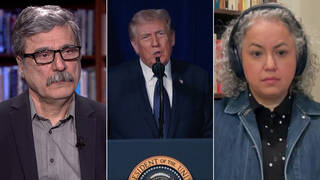
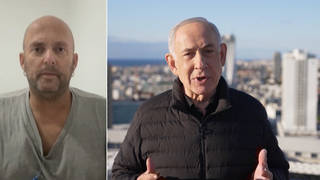
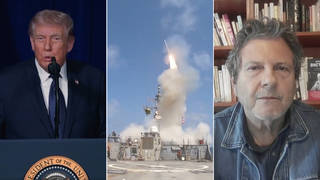
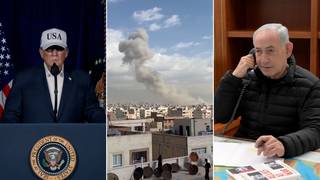




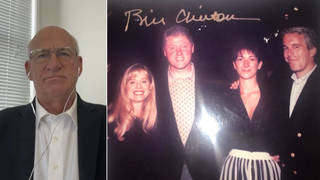
Media Options